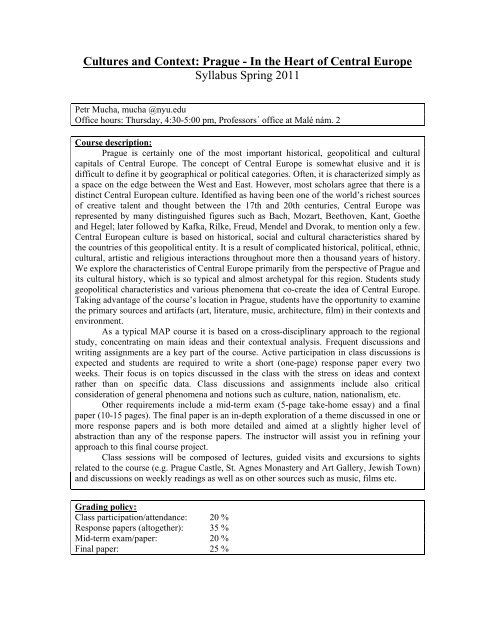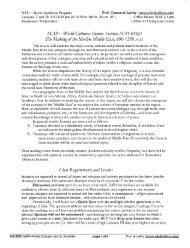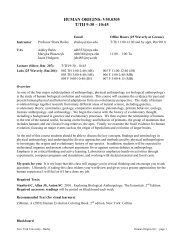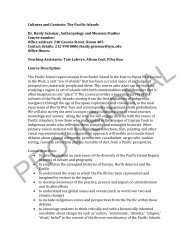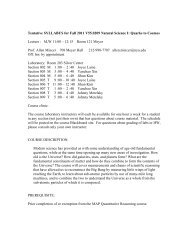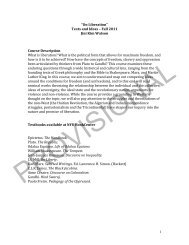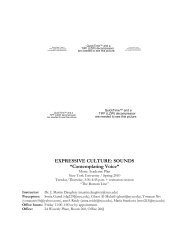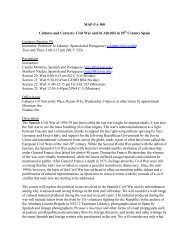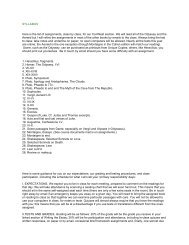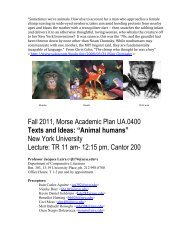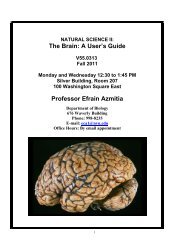Syllabus
Syllabus
Syllabus
Create successful ePaper yourself
Turn your PDF publications into a flip-book with our unique Google optimized e-Paper software.
Cultures and Context: Prague - In the Heart of Central Europe<br />
<strong>Syllabus</strong> Spring 2011<br />
Petr Mucha, mucha @nyu.edu<br />
Office hours: Thursday, 4:30-5:00 pm, Professors´ office at Malé nám. 2<br />
Course description:<br />
Prague is certainly one of the most important historical, geopolitical and cultural<br />
capitals of Central Europe. The concept of Central Europe is somewhat elusive and it is<br />
difficult to define it by geographical or political categories. Often, it is characterized simply as<br />
a space on the edge between the West and East. However, most scholars agree that there is a<br />
distinct Central European culture. Identified as having been one of the world’s richest sources<br />
of creative talent and thought between the 17th and 20th centuries, Central Europe was<br />
represented by many distinguished figures such as Bach, Mozart, Beethoven, Kant, Goethe<br />
and Hegel; later followed by Kafka, Rilke, Freud, Mendel and Dvorak, to mention only a few.<br />
Central European culture is based on historical, social and cultural characteristics shared by<br />
the countries of this geopolitical entity. It is a result of complicated historical, political, ethnic,<br />
cultural, artistic and religious interactions throughout more then a thousand years of history.<br />
We explore the characteristics of Central Europe primarily from the perspective of Prague and<br />
its cultural history, which is so typical and almost archetypal for this region. Students study<br />
geopolitical characteristics and various phenomena that co-create the idea of Central Europe.<br />
Taking advantage of the course’s location in Prague, students have the opportunity to examine<br />
the primary sources and artifacts (art, literature, music, architecture, film) in their contexts and<br />
environment.<br />
As a typical MAP course it is based on a cross-disciplinary approach to the regional<br />
study, concentrating on main ideas and their contextual analysis. Frequent discussions and<br />
writing assignments are a key part of the course. Active participation in class discussions is<br />
expected and students are required to write a short (one-page) response paper every two<br />
weeks. Their focus is on topics discussed in the class with the stress on ideas and context<br />
rather than on specific data. Class discussions and assignments include also critical<br />
consideration of general phenomena and notions such as culture, nation, nationalism, etc.<br />
Other requirements include a mid-term exam (5-page take-home essay) and a final<br />
paper (10-15 pages). The final paper is an in-depth exploration of a theme discussed in one or<br />
more response papers and is both more detailed and aimed at a slightly higher level of<br />
abstraction than any of the response papers. The instructor will assist you in refining your<br />
approach to this final course project.<br />
Class sessions will be composed of lectures, guided visits and excursions to sights<br />
related to the course (e.g. Prague Castle, St. Agnes Monastery and Art Gallery, Jewish Town)<br />
and discussions on weekly readings as well as on other sources such as music, films etc.<br />
Grading policy:<br />
Class participation/attendance: 20 %<br />
Response papers (altogether): 35 %<br />
Mid-term exam/paper: 20 %<br />
Final paper: 25 %
Recommended readings:<br />
Demetz, P.: Prague in Black and Gold - Scenes in the life of a European City, 1997. Penguin,<br />
London.<br />
Johnson, L.R.: Central Europe - Enemies, Neighbors, Friends, 1996. Oxford University Press,<br />
New York.<br />
Klíma, I.: The Spirit of Prague, 1994. Granta Books, London.<br />
Lord, C. ed.: Central Europe: Core Or Periphery?, 2000. Copenhagen Business School Press,<br />
Copenhagen.<br />
Rupnik, J.: The Other Europe, 1989. Weidenfeld and Nicolson, London.<br />
Stern, J.P.: The Heart of Europe – Essays on Literature and Ideology, 1992. Blackwell, Oxford.<br />
Teich, M. ed.: Bohemia in History, 1998. Cambridge University Press, Cambridge.<br />
Texts for weekly readings will be available on the internet.<br />
Schedule of classes:<br />
Week 1<br />
27 January: Course overview and introduction.<br />
Reading: „In Search of Central Europe“ by Jaques Rupnik<br />
Week 2<br />
3 February: Geographical concepts of Central Europe, geopolitical dynamics - “A space<br />
between powers.”<br />
Reading: “Central Europe - The Rise and Fall of a Historical Region” by Miroslav Hroch<br />
Week 3<br />
10 February: Historical foundations - the birth of Central Europe; feudalism and the medieval<br />
idea of Central Europe.<br />
Readings: “Feudal Foundations” by Lonnie Johnson, “The Crown of Saint Wenceslas” by<br />
Derek Sayer<br />
Week 4<br />
17 February: Cultural development in medieval period -“In the heart of the European heart.”<br />
Readings: “Central Europe in Art History” By Eliška Fučíková, “Politics and Culture under<br />
Charle IV” by František Kavka, “Humanism and Science in Rudolphine Prague: Kepler in<br />
Context” by Anthony Grafton<br />
Week 5<br />
24 February: “Golden time of thoughts” - Central European culture from 17 th to early 20 th<br />
centuries.<br />
Readings: “Is There a Central-European Identity in Literature?” by Ewald Osers, “Mozart in<br />
Prague” by Peter Demetz<br />
Primary source: excerpts from “Two Stories of Prague” by R. M. Rilke<br />
Week 6<br />
3 March: Religion and the idea of Central Europe in medieval period.<br />
Reading: “Religion and the European Soul” by Tomáš Halík<br />
Primary source: excerpts from the “First Letter of Claire of Assisi to Agnes of Bohemia”<br />
Week 7<br />
10 March: “On the edge” - the role of religion in Central Europe in modern and contemporary<br />
periods.
Reading: “The Bulwarks of Christendom” by Loonie Johnson<br />
Primary source: excepts from “Future of an Illusion” by Sigmund Freud<br />
Week 8<br />
17 March: Central European absolutism and consequences - “Among growing giants.”<br />
Readings: “Absolutism as Enlightenment” by Lonnie Johnson<br />
Primary source: “Enlightened Absolutism” - Lentin´s collection of official state documents of<br />
the Habsburg monarchy 1770-1787<br />
**Midterm Paper Due**<br />
Week 9 – Spring Break – no classes<br />
Week 10<br />
31 March: “Rise of a nation” - nationalism in the Central European context; concept of<br />
Mitteleuropa, Pan-Slavism and Sudeten Germans.<br />
Readings: “Problems and paradoxes of the national revival” by Vladimír Macura, „Czechs,<br />
Germans, Bohemians?” by Hurh Agnew<br />
Primary source: excerpts from “Old Bohemian Legends” by Alois Jirásek<br />
Week 11<br />
7 April: Jewry and its contribution to the Central European idea.<br />
Reading: “Czechs and Jews” by Helena Krejčová<br />
Primary sources: Rabbi Loew and Golem Legend, excerpts from “Selected Stories” by Franz<br />
Kafka<br />
Week 12<br />
14 April: Young democracy in a struggle against Nazism.<br />
Readings: „Building up German Hegemony in Central Europe” by Raffael Scheck<br />
Primary source: excerpts from “Democracy and Humanity” by Tomáš G. Masaryk<br />
Week 13<br />
21 April: Russian hegemony and the communist totalitarianism in the heart of Europe.<br />
Readings: “A Moscow Perspective” by Alexei Arbatov<br />
“The Poetics of a Political Trial - Working People vs. Rudolf Slánký and His Fellow<br />
Conspirators” by Peter Steiner, Excerpts from “Power of the Powerless” by Václav Havel<br />
Week 14<br />
28 April: “Seeking the lost European identity” - the new Central Europe and postcommunism.<br />
Reading: excerpts from „Making capitalism without capitalists: class formation and elite<br />
struggles in post-communist Central Europe“ by Gil Eyal, Iván Szelényi and Eleanor<br />
Townsley<br />
Week 15<br />
5 May: Central Europe, European Union and contemporary international relations.<br />
Reading: “European Identity and the Enlargement of the European Union” by Ingmar<br />
Karlsson<br />
Week 16<br />
**Final Paper Due**


